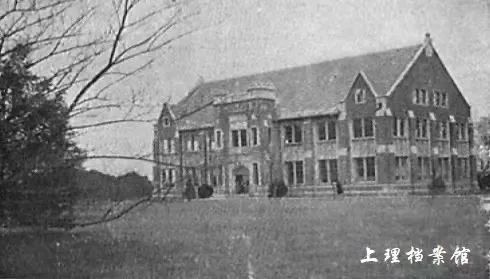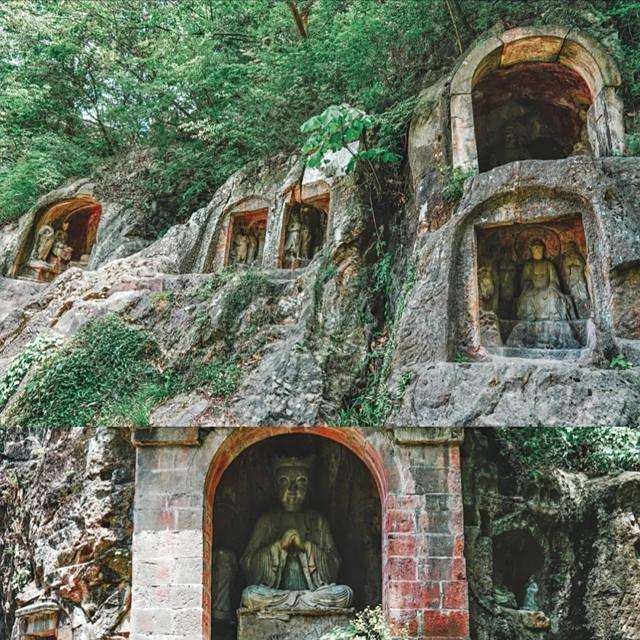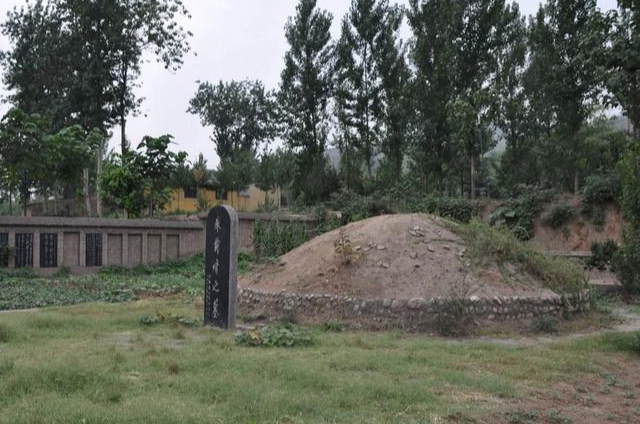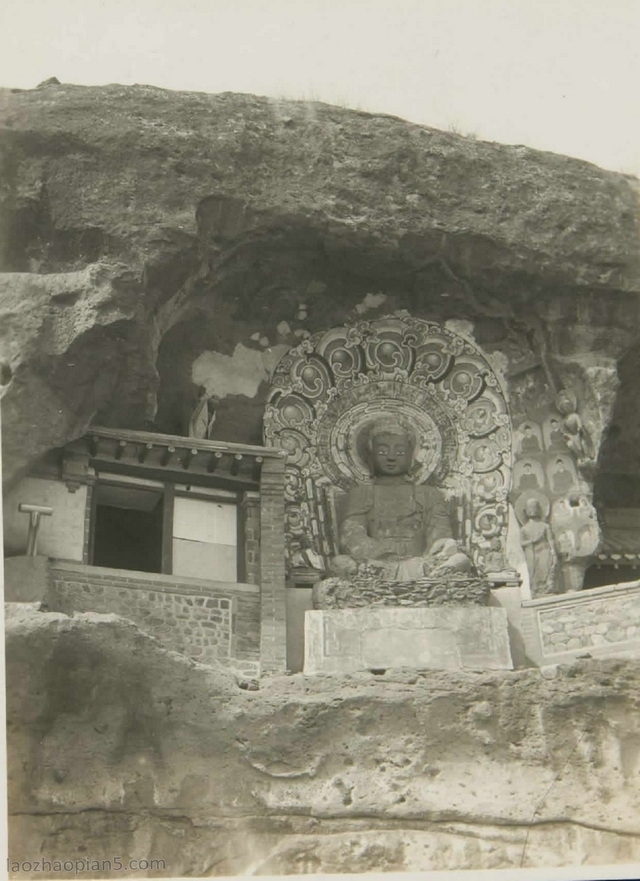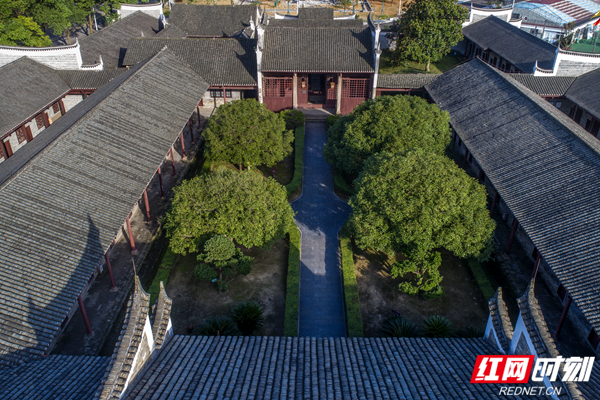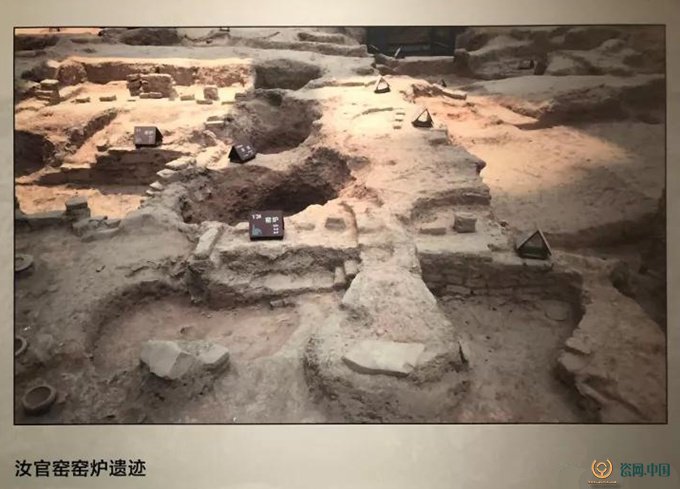Discover the Hidden Gem: Yangmingdong He Yangmingci in Guiyang, Guizhou
An Essential Guide to Visiting Guiyang Yangmingdong He Yangmingci
In This Guide
- An Essential Guide to Visiting Guiyang Yangmingdong He Yangmingci
- The Rich History of Guiyang Yangmingdong He Yangmingci
- Main Highlights: What to See at Guiyang Yangmingdong He Yangmingci
- Planning Your Visit: A Practical Guide
- Tickets, Hours, and Booking
- How to Get There
- Local Cuisine and Accommodation
- Frequently Asked Questions
- Final Thoughts on Your Trip
Nestled in the verdant hills of Guizhou province, the Yangmingdong and Yangmingci sites are a testament to the profound legacy of Wang Yangming, a towering figure in Chinese philosophy and education. This serene locale, steeped in history, invites travelers to explore the very ground where the seeds of Yangming’s groundbreaking thoughts—centered on the concepts of “knowledge and action as one” and “the mind as truth”—were sown.
Wang Yangming, a polymath of the Ming Dynasty, was not only a renowned philosopher but also a military strategist and educator whose teachings have left an indelible mark on Chinese culture. The Yangmingdong, or Yangming Cave, served as a sanctuary for him during his years of exile in the early 16th century, where he experienced a profound enlightenment that would shape his philosophical doctrines. Meanwhile, the Yangmingci, or Yangming Temple, is dedicated to his memory, showcasing the cultural reverence held for this extraordinary thinker.
Visitors to these sites will find themselves enveloped in tranquility, surrounded by lush landscapes that inspired Wang’s reflections and teachings. The journey through Yangmingdong and Yangmingci is not just a historical exploration but a spiritual pilgrimage that connects the past with present-day philosophical inquiries. As you tread the same paths that Wang once walked, you’ll gain insight not only into his life and thoughts but also into the broader currents of Chinese history and philosophy. The rich narratives embedded in these sacred grounds beckon both scholars and casual travelers alike to delve deeper into the wisdom of one of China’s most influential minds.
The Rich History of Guiyang Yangmingdong He Yangmingci
The rich historical tapestry of Guiyang’s Yangmingdong and Yangmingci is woven through the life of one of China’s most revered philosophers, Wang Yangming (王阳明). Born in 1472, Wang was a prominent figure of the Ming dynasty, known for his contributions to philosophy, education, and military strategy. His thoughts, particularly the concept of “Mind as Principle” (心即理) and the principle of “Unity of Knowledge and Action” (知行合一), form the foundation of what is known as Yangmingism, a significant school of Neo-Confucian thought.
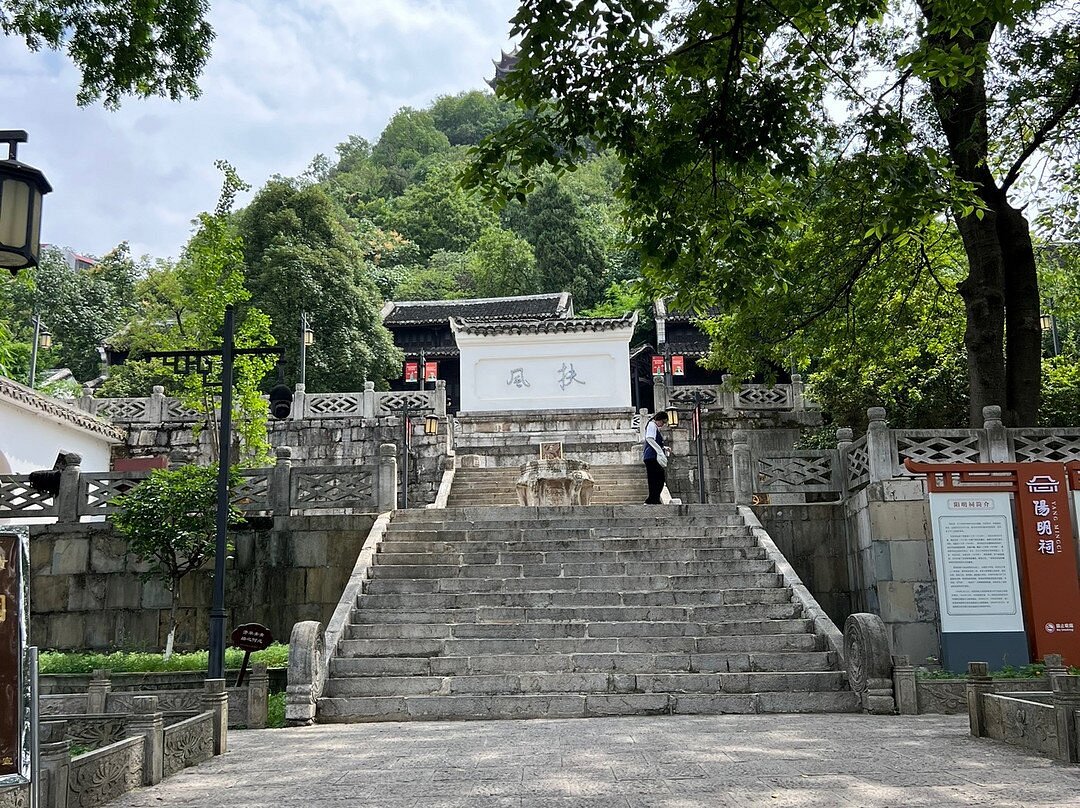
Guiyang Yangmingdong He Yangmingci.
The site of Yangmingdong, or Yangming Cave, holds immense significance as it is here that Wang Yangming experienced a transformative epiphany in 1508, during his exile in the remote Dragon Field (龙场) of present-day Xiuwen County, Guizhou. This period of hardship was not merely a punishment; it became a crucible for profound philosophical development. It was in this cave that he articulated the revolutionary idea that understanding and action are not separate but rather interconnected, a concept that challenged the prevailing thoughts of his time.
Wang Yangming’s initial settlement in the mountainous and isolated region was marked by adversity. Upon his arrival, he faced not only the physical challenges of the rugged terrain but also the emotional turmoil of exile. Living in a makeshift hut and enduring harsh conditions, Wang’s isolation gave way to deep reflection. His thoughts began to crystallize into a philosophy that emphasized intrinsic morality and the importance of personal experience in understanding truth. This philosophical awakening, often referred to as the “Dragon Field Enlightenment” (龙场悟道), established his teachings as a new beacon of moral clarity and intellectual freedom.
The historical significance of Yangmingdong extends beyond Wang’s personal journey. The cave and its surroundings became a center for learning and the propagation of his philosophies. His teachings attracted numerous students, leading to the establishment of Dragon Peak Academy (龙冈书院) nearby. This institution played a crucial role in disseminating Wang’s ideas, not only in Guizhou but also throughout China, influencing later generations of scholars and political leaders.
In recognition of Wang Yangming’s contributions, the Yangmingci, or Yangming Temple, was built in the 19th century during the Qing dynasty as a memorial to his legacy. This temple complex is strategically located at the foothills of Fufeng Mountain and comprises several ancient structures that collectively honor Wang’s life, philosophies, and enduring influence. The serene environment of the temple, with its classical architecture, serves as a testament to Wang’s ideals of learning, introspection, and the pursuit of moral integrity.
The temple and the cave together form a unique cultural heritage site, drawing visitors who seek to connect with Wang Yangming’s teachings and reflect on their own lives. They symbolize the profound impact of his thoughts on Chinese philosophy, education, and governance, echoing through centuries and continuing to inspire modern thinkers and leaders.
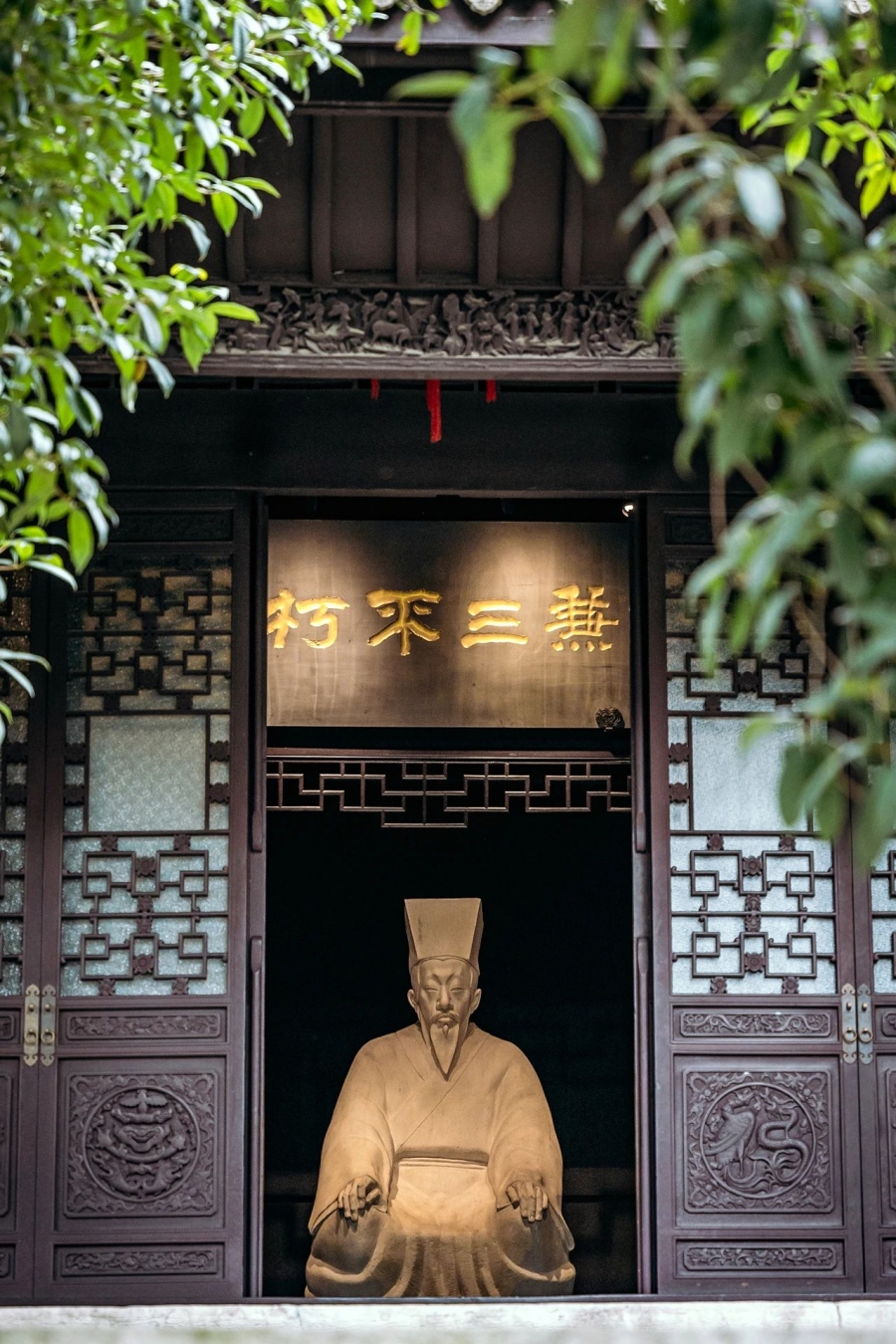
Guiyang Yangmingdong He Yangmingci.
In essence, the history of Yangmingdong and Yangmingci encapsulates not just the life of a remarkable philosopher but also the evolution of a significant intellectual movement in China that emphasizes the unity of thought and action, the intrinsic goodness within human nature, and the importance of personal experience in the quest for knowledge. As such, these sites are not merely historical landmarks; they are vibrant reminders of the enduring power of philosophy to shape human understanding and action.
Main Highlights: What to See at Guiyang Yangmingdong He Yangmingci
Nestled in the lush landscapes of Guizhou Province, the Yangmingdong (阳明洞) and Yangmingci (阳明祠) sites offer a profound glimpse into the life and philosophy of Wang Yangming, one of China’s most revered philosophers and educators. Visitors to this historical area can expect to encounter a rich tapestry of culture, nature, and intellectual heritage.
Wang Yangming’s Legacy
At the heart of Yangmingdong is the cave where Wang Yangming experienced a pivotal awakening in his philosophical journey. It was here, during a period of exile, that he developed his influential ideas of “Heart as Principle” (心即理) and “Unity of Knowledge and Action” (知行合一). The cave serves as a silent witness to his contemplative struggles and breakthroughs, drawing scholars and curious travelers alike to reflect on the nature of knowledge and morality.
The Yangming Culture Park
Adjacent to the cave, the expansive Yangming Culture Park encompasses numerous architectural highlights, including the Wang Wencheng Gong Temple (王文成公祠), which honors Wang Yangming’s contributions to philosophy and education. The park’s serene gardens and pavilions provide a tranquil setting for visitors to meditate on Wang’s teachings while surrounded by the natural beauty of Dragon Ridge Mountain (龙冈山).
Cultural Significance
The area is not just a historical landmark; it is a vibrant center for the study of Wang Yangming’s philosophy, known as Yangmingism. The local government has established various educational facilities and memorials, such as the Longgang Academy (龙冈书院) and the Yangming Memorial Hall, dedicated to fostering an understanding of his teachings and their relevance in contemporary society.
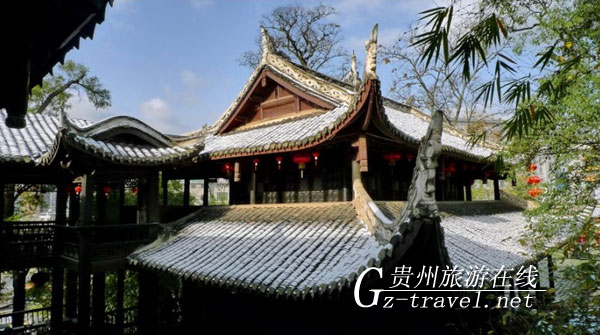
Guiyang Yangmingdong He Yangmingci.
Scenic Beauty
The journey to Yangmingdong is as rewarding as the destination itself. As visitors traverse the winding paths lined with ancient trees and bamboo, they are treated to breathtaking views of the surrounding mountains and valleys. The cave itself, with its impressive rock formations and tranquil atmosphere, invites introspection and appreciation for the profound thoughts that emerged from its depths.
Engaging with History
For those interested in a deeper exploration, the inscriptions and stone carvings found throughout the site tell stories of Wang Yangming’s life and philosophy. Notable among these is a massive stone tablet inscribed with “The Place Where Yangming Left His Legacy,” a testament to the enduring impact of his teachings.
In summary, a visit to Yangmingdong and Yangmingci is more than just a journey through a beautiful landscape; it is an opportunity to connect with a critical chapter in Chinese intellectual history and to reflect on the timeless principles that continue to resonate today. Whether you are a history enthusiast, a philosophy student, or simply someone seeking peace in nature, this site promises a rich and fulfilling experience.
Planning Your Visit: A Practical Guide
Practical Guide to Visiting Guiyang Yangmingdong and Yangmingci
If you’re planning a visit to Guiyang, particularly to explore the historical and cultural sites of Yangmingdong (阳明洞) and Yangmingci (阳明祠), this practical guide will help you navigate your journey with ease. Situated in the picturesque region of Xuwen County, these sites are deeply rooted in Chinese philosophy and history, specifically connected to the eminent thinker Wang Yangming.
Getting There
Transportation Options:
– Public Transport: The easiest way to reach Yangmingdong from Guiyang is by taking a bus. Head to the main bus station and look for buses heading to Xuwen County. The journey typically takes about an hour.
– Taxi: Alternatively, you can hire a taxi directly from Guiyang, which offers a more comfortable and quicker option, especially if you’re traveling with a group.
– Private Car: For those who prefer to drive, renting a car is a viable option. The roads are generally well-maintained, and the scenic views along the way are worth the trip.
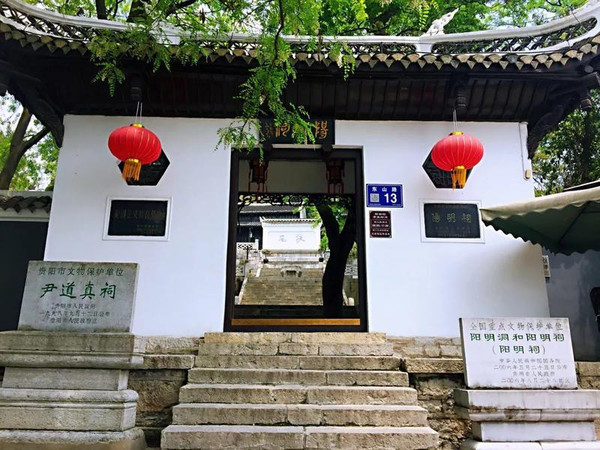
Guiyang Yangmingdong He Yangmingci.
Best Time to Visit
The ideal time to visit Yangmingdong and Yangmingci is during the spring and autumn months (March to May and September to November). During these seasons, the weather is mild, making it perfect for outdoor exploration. Summer can be hot and humid, while winters may bring chilly temperatures.
Entry Fees and Hours
- Yangmingdong: Admission to Yangmingdong is typically free, but donations are appreciated to help maintain the site. The cave is open year-round, but it’s advisable to check local sources for any temporary closures.
- Yangmingci: The entrance fee for Yangmingci is around 3 RMB per person. The site is open from 8:00 AM to 5:00 PM daily.
What to See
- Yangmingdong (阳明洞):
- This cave is significant as it served as a retreat for Wang Yangming during his exile, where he developed his philosophical ideas. Inside, you can find various inscriptions and relics that reflect his thoughts and teachings.
-
Take a moment to appreciate the tranquil environment and the remarkable rock formations that surround the cave.
-
Yangmingci (阳明祠):
- This memorial park is dedicated to Wang Yangming and includes several ancient buildings and monuments. The serene atmosphere makes it a perfect spot for reflection on his teachings.
- Don’t miss the grand statue of Wang Yangming, which stands prominently within the complex, symbolizing his lasting influence.
What to Bring
- Comfortable Footwear: The terrain can be uneven, especially around the cave and the walking paths of Yangmingci. Wear sturdy shoes to ensure a pleasant experience.
- Water and Snacks: While there are no major food facilities within the immediate vicinity, carrying water and light snacks is advisable, especially if you plan to spend several hours exploring.
- Camera: Capture the stunning natural beauty and historical architecture of both sites.
Local Tips
- Guided Tours: Consider joining a guided tour for deeper insights into Wang Yangming’s philosophy and the historical significance of the sites.
- Respect the Environment: As with any cultural site, it’s important to maintain cleanliness and respect the local customs. Avoid littering and noise, especially in the serene environment of the cave.
- Timing Your Visit: Early morning or late afternoon visits can provide a quieter experience, allowing you to fully engage with the surroundings and appreciate the philosophical reflections of Wang Yangming.
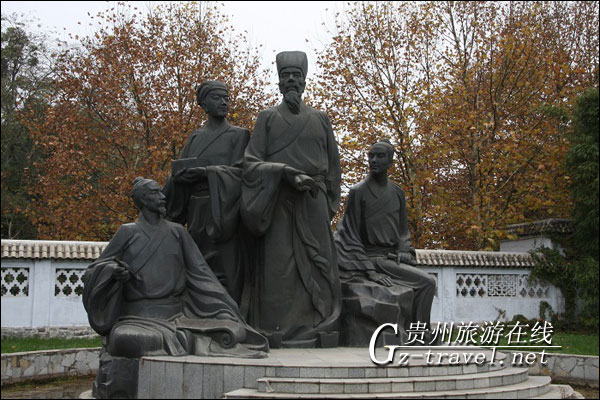
Guiyang Yangmingdong He Yangmingci.
Nearby Attractions
If time permits, consider exploring other attractions in the area, such as the beautiful Dragon Mountain (龙冈山), which offers scenic hiking trails, or the local markets in Xuwen County for a taste of regional cuisine and culture.
Visiting Yangmingdong and Yangmingci is not just about exploring historical sites; it’s about engaging with the rich philosophical legacy of Wang Yangming, making it a meaningful addition to your travel itinerary in Guiyang.
Tickets, Hours, and Booking
When planning your visit to Yangmingdong and Yangmingci in Guiyang, here’s what you need to know about ticketing:
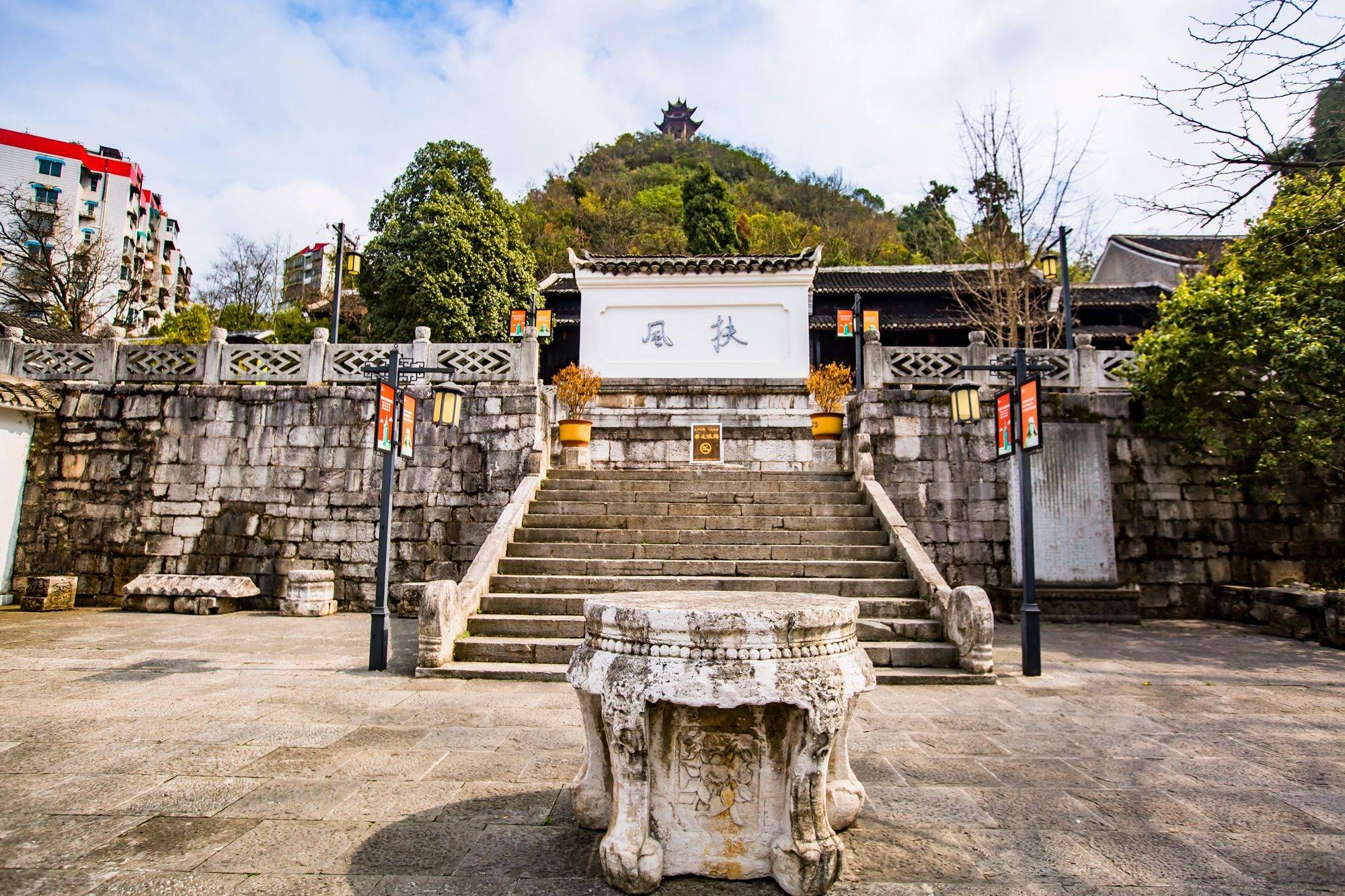
Guiyang Yangmingdong He Yangmingci.
The entrance fee for Yangmingci is a modest 3 RMB per person. This small fee grants you access to this historically significant site, where you can explore the serene surroundings dedicated to the renowned Ming Dynasty philosopher Wang Yangming, known for his contributions to Confucian thought and the development of the School of Mind.
Both Yangmingdong, the cave where Wang Yangming experienced moments of profound realization, and the surrounding cultural park are generally included in the same visit. There are no additional tickets required for accessing the cave itself, allowing you to fully immerse yourself in the philosophical and natural beauty of this area.
The site is open to visitors throughout the year, though it’s advisable to check local schedules or any seasonal events that may affect visiting hours. Enjoy your journey through history and philosophy at this remarkable destination!
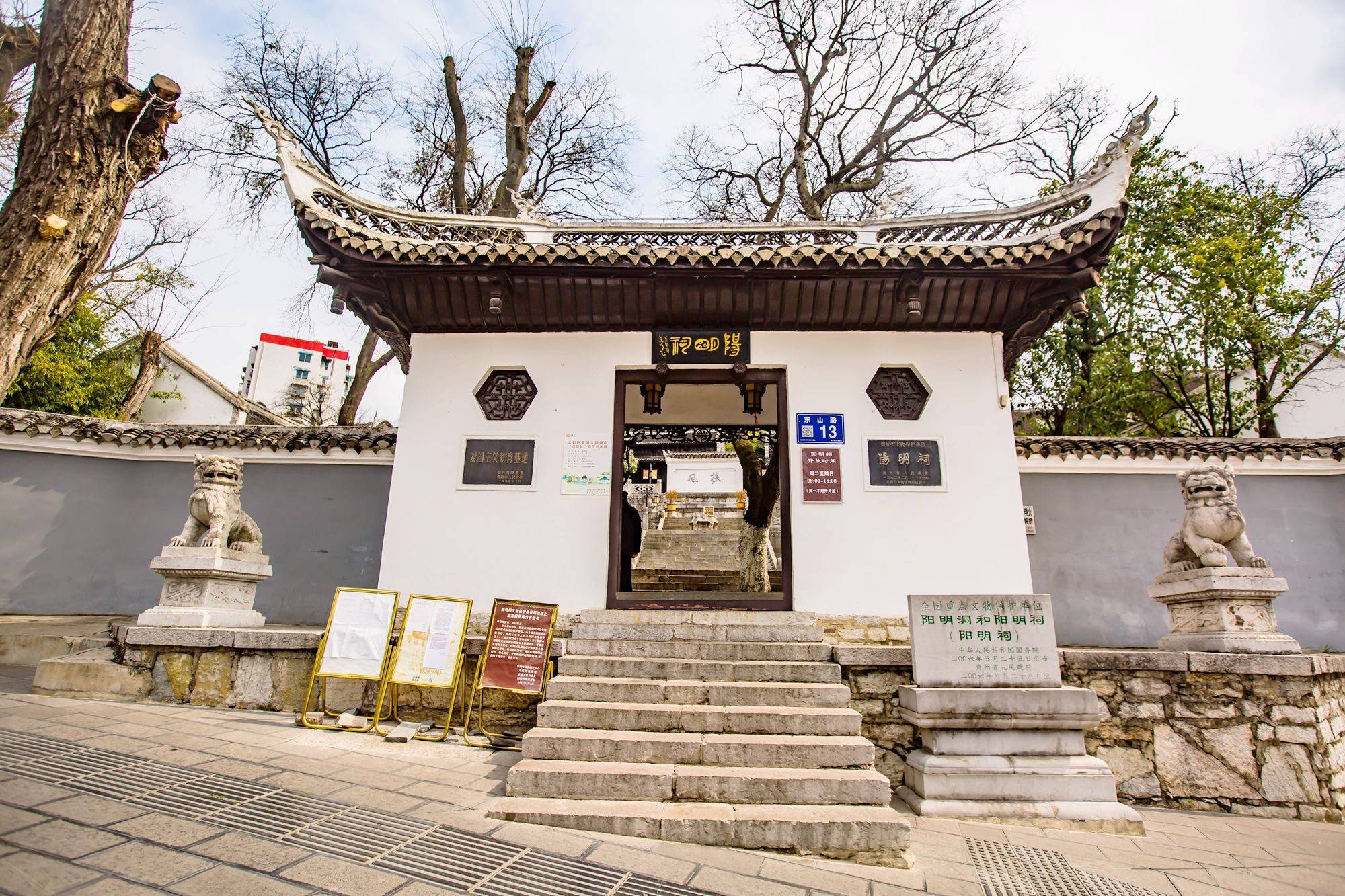
Guiyang Yangmingdong He Yangmingci.
How to Get There
Reaching Guiyang Yangmingdong He Yangmingci (阳明洞和阳明祠) requires a bit of planning, as the site is located in the scenic and culturally rich region of Xiuwen County, near Guiyang, the capital of Guizhou Province. Here’s how you can navigate your way to this historical destination.
Getting There
By Air:
The nearest major airport is Guiyang Longdongbao International Airport (KWE), which is about 30 kilometers from Xiuwen County. Once you land, you have several options to reach your destination.
By Taxi:
The most convenient way from the airport is to take a taxi. The trip to Yangmingdong takes approximately 40 minutes, and you should expect to pay around 100-150 CNY. Ensure that the taxi uses the meter, or agree on a fare before you set off.
By Bus:
For a more economical option, you can take a shuttle bus from the airport to Guiyang city center. From there, head to the local bus station to catch a bus to Xiuwen County. Buses run frequently, and the journey takes about an hour. Look for buses heading to Xiuwen or specifically to Yangmingdong.
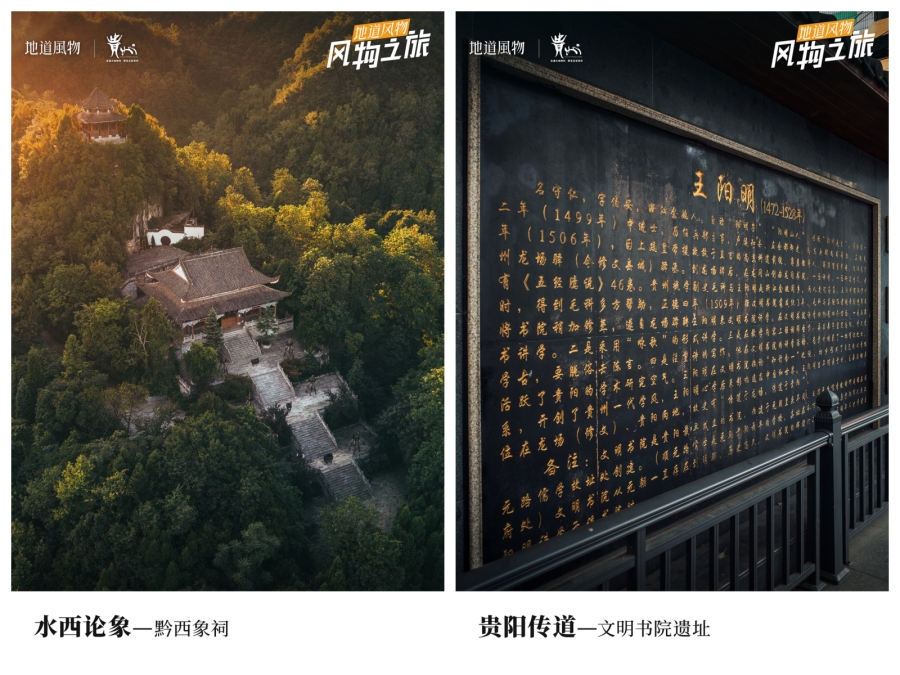
Guiyang Yangmingdong He Yangmingci.
By Train:
If you are already in another city in Guizhou, you might consider taking a train to Guiyang. The train station in Guiyang is well-connected, and from there, you can transfer to a bus or taxi to reach Yangmingdong.
Local Transportation
Within Xiuwen County:
Once you arrive in Xiuwen County, you can use local taxis or ride-hailing apps like Didi Chuxing to reach Yangmingdong and Yangmingci. The ride should take about 20 minutes from the center of Xiuwen.
Public Buses:
There are also local buses that connect various parts of Xiuwen County, including routes to the Yangming cultural park. Bus fares are very affordable, typically costing less than 5 CNY per ride.
Tips for Travelers
- Language Barrier: English may not be widely spoken in this area, so having a translation app or a phrasebook can be helpful.
- Cash: While larger establishments may accept credit cards, it’s wise to carry cash (CNY) for smaller purchases and transportation.
- Timing: Check the operating hours of buses and taxis to avoid delays, especially if you plan to visit early in the morning or later in the evening.
- Plan Your Return: Make sure to confirm return transport options back to Guiyang or your next destination to ensure a smooth journey.
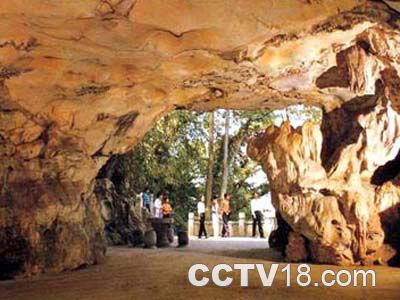
Guiyang Yangmingdong He Yangmingci.
By following this transportation guide, you can easily navigate your way to the historical and cultural significance of Guiyang Yangmingdong He Yangmingci, ensuring a memorable visit to this philosophical landmark in China.
Local Cuisine and Accommodation
When visiting Guiyang’s Yangmingdong and Yangmingci, travelers can immerse themselves in the region’s rich cultural heritage while savoring local flavors and enjoying comfortable accommodations.
Culinary Delights
Guiyang is renowned for its unique culinary scene, heavily influenced by the region’s ethnic diversity. Here are some must-try dishes and eateries near Yangmingdong and Yangmingci:
-
Sour Soup Fish (酸汤鱼): A signature dish of Guizhou, this dish features tender fish cooked in a tangy, spicy broth made from pickled vegetables and herbs. Try it at Xiaoyang Fish Restaurant (小杨鱼馆) for an authentic experience.
-
Spicy Noodles (辣子面): For a quick and satisfying meal, local noodle shops serve up spicy noodles topped with various ingredients such as vegetables, meat, and peanuts. Zha Zha Fresh Noodles (招招鲜牛肉粉) is a popular spot for these flavorful bowls.
-
Guizhou Hot Pot (贵州火锅): Enjoy a communal dining experience with a rich variety of ingredients cooked in a bubbling pot of spicy broth. Fuxing Hot Pot (福兴火锅店) is well-reviewed for its fresh ingredients and vibrant atmosphere.
-
Grilled Fish (烤鱼): This popular street food can be found at numerous stalls throughout the area. Enjoy the smoky flavor and spices, often accompanied by local beers.
-
Tianjin Ma Hua (天津麻花): A sweet, crispy treat perfect for snacking while exploring the sites, these fried dough twists are a local favorite.
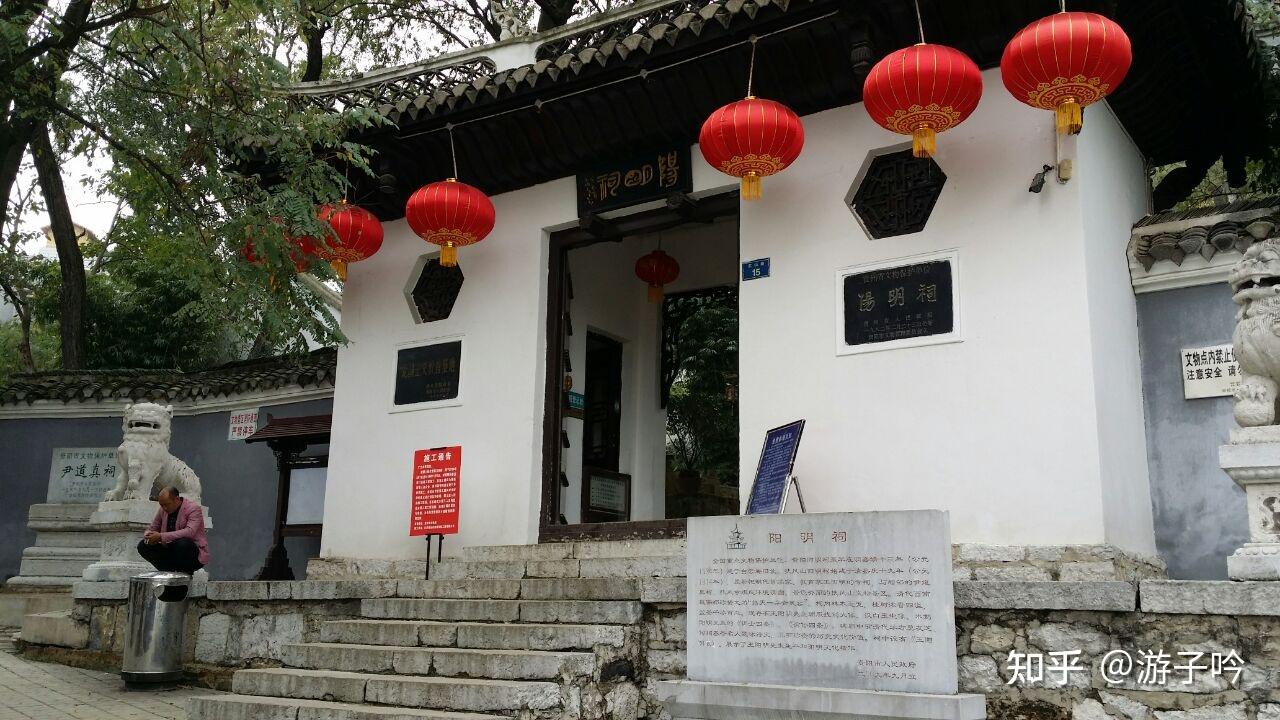
Guiyang Yangmingdong He Yangmingci.
Places to Stay
For a restful night after a day of exploration, consider these accommodations which offer comfort and convenience:
-
Guiyang Longyang Hotel (贵阳龙阳酒店): Located close to the city center, this hotel offers modern amenities, comfortable rooms, and is within easy reach of public transport to Yangmingdong.
-
Crowne Plaza Guiyang (贵阳皇冠假日酒店): A luxurious option with spacious rooms, a fitness center, and several dining options. It’s perfect for travelers seeking upscale comfort and service.
-
Qinglong Hotel (青龙酒店): A budget-friendly option that provides clean, comfortable rooms. It’s a short drive from the major attractions, making it a convenient choice for budget-conscious travelers.
-
Huanghe Hotel (黄河酒店): A cozy mid-range hotel that features traditional decor and a warm atmosphere. It’s known for its friendly staff and convenient location near local eateries.
-
Local Guesthouses: For a more authentic experience, consider staying at a guesthouse or homestay in the area. Many offer personalized service and local insights that enhance your visit.
Final Thoughts
Whether indulging in the diverse flavors of Guizhou or enjoying a comfortable stay, the Yangmingdong and Yangmingci area provides a memorable experience for all travelers. Make sure to savor the local cuisine and choose accommodations that suit your style, ensuring a delightful exploration of this culturally rich region.
Frequently Asked Questions
-
What is Yangmingdong (阳明洞) and its significance?
Yangmingdong, or Yangming Cave, is a historical site located in Longgang Mountain, Xiuwen County, Guizhou Province. It is revered as the birthplace of Wang Yangming’s philosophy. Wang Yangming, a prominent Ming dynasty philosopher, experienced a profound enlightenment here, leading to the development of his ideas on “the unity of knowledge and action” and “innate knowledge.” The cave symbolizes a key moment in Chinese philosophical history. -
How do I get to Yangmingdong from Guiyang?
To reach Yangmingdong from Guiyang, you can take a bus from Guiyang to Xiuwen County. Once you arrive in Xiuwen, taxis are available to take you directly to the Yangming Cultural Park, where Yangmingdong is located. Be sure to check local bus schedules for the most convenient timings. -
What are the opening hours for Yangmingdong and the surrounding attractions?
Yangmingdong and the associated cultural park are typically open from 8:00 AM to 5:00 PM. However, visiting hours may vary seasonally or due to special events, so it’s advisable to check in advance before planning your visit. -
Is there an entrance fee to visit Yangmingdong?
Yes, there is a nominal entrance fee for the Yangming Cultural Park. The ticket price is usually around 3 RMB per person, which grants access to both Yangmingdong and other sites within the park. -
What can I expect to see at Yangmingdong?
Visitors to Yangmingdong can explore the cave itself, which features ancient inscriptions and rock carvings dating back to the Ming and Qing dynasties. Additionally, the surrounding park includes memorials, pavilions, and Wang Yangming’s statue, all of which reflect his teachings and contributions to philosophy. -
Are there guided tours available?
Yes, guided tours are available for visitors who want a more in-depth understanding of Wang Yangming’s life and philosophy, as well as the historical context of Yangmingdong. These tours can often be arranged at the entrance of the park or through local travel agencies. -
What should I wear when visiting Yangmingdong?
Comfortable clothing and sturdy shoes are recommended for your visit, especially since the terrain around the cave may involve some walking and climbing. If you plan to visit during the rainy season, bring waterproof gear as well. -
Are there any accommodations near Yangmingdong?
While there are limited accommodations directly adjacent to Yangmingdong, nearby Xiuwen County offers various hotels and guesthouses. It’s advisable to book in advance, especially during peak travel seasons, to ensure availability.
Final Thoughts on Your Trip
In closing, a visit to Guiyang’s Yangmingdong and Yangmingci transcends mere sightseeing; it is a profound journey into the essence of Chinese philosophy and history. Here, amidst the serene mountain landscapes, the legacy of Wang Yangming, a luminary of Neo-Confucian thought, comes alive. His teachings on the unity of knowledge and action resonate through the ages, inviting contemplation and introspection.
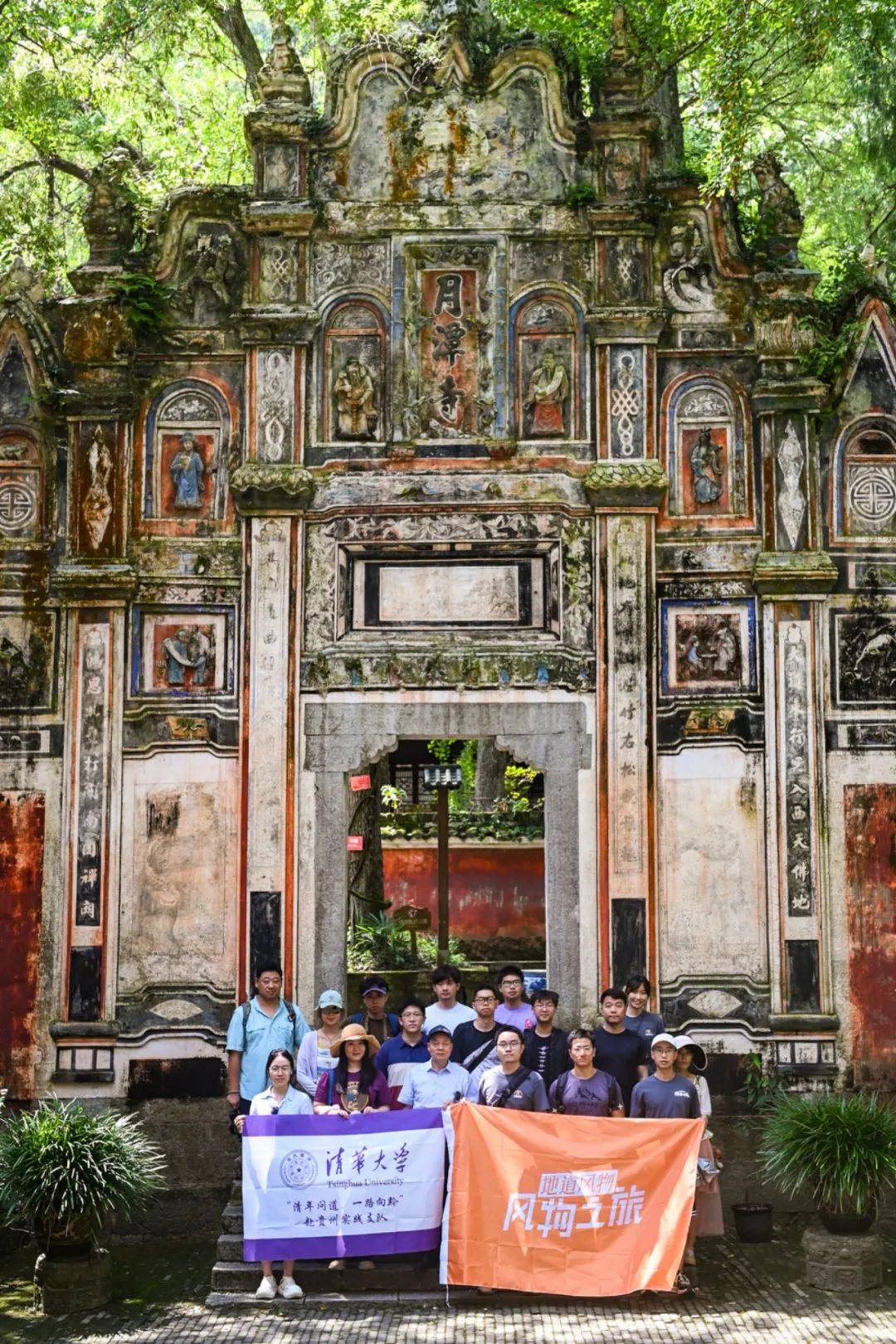
Guiyang Yangmingdong He Yangmingci.
As you explore the sacred grounds of Yangmingdong, where Wang once sought enlightenment, and wander through the tranquil spaces of Yangmingci, you are not just stepping into a historical site, but rather a sanctuary of wisdom that continues to inspire seekers of knowledge. The echoes of his profound insights remind us that true understanding and moral integrity are pathways to personal and societal harmony.
Let the spirit of Yangming guide you, encouraging a deeper connection with your own journey of self-discovery. Embrace the rich cultural heritage of this remarkable place and allow it to illuminate your own path, fostering a deeper appreciation for the intricate tapestry of thought that has shaped not only China but the world. Your adventure at Yangmingdong and Yangmingci is both a pilgrimage and a celebration of the enduring quest for wisdom that defines humanity.
